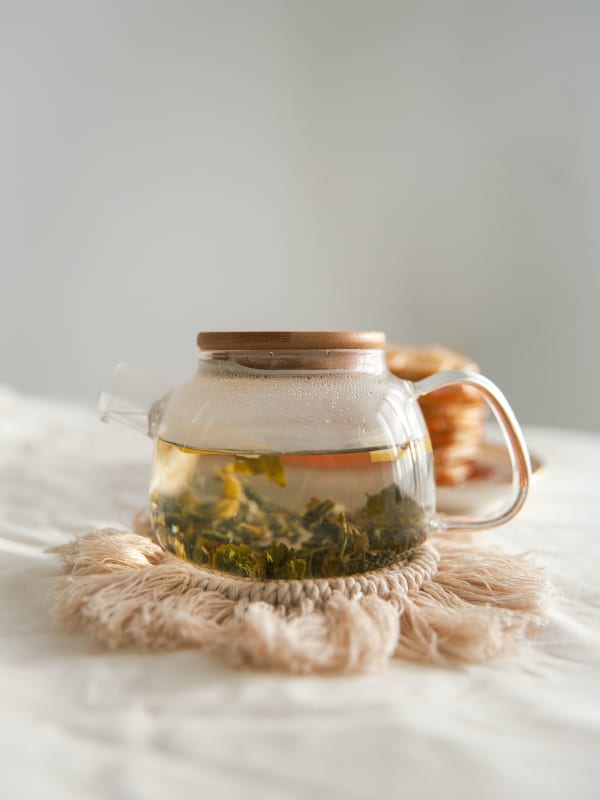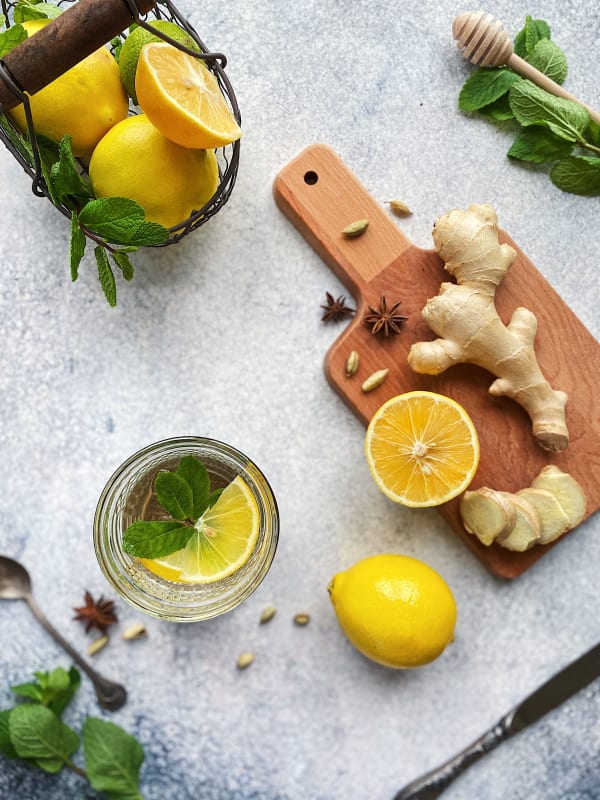Popular Conditions & Diets

Invincible immunity isn’t about chasing one “magic” superfood; it’s about protecting the immune system from predictable daily hits and then feeding it what it needs to function. When stress is high, sleep is shaky, sugar is frequent, and alcohol is regular, immune defences get compromised for hours at a time. When those are under control, you can meaningfully stack the odds in your favour with repeatable habits: protein at meals, fermented foods, green tea, and a short list of potent winter staples (garlic, ginger, mushrooms, selenium-rich Brazil nuts).
Getting the flu, or even a bad cold, sucks… especially when it seems like you just recovered from the last one.
The good news is that we are very far from helpless. The scientific literature is chock full of high-quality studies showing that certain foods and nutrients are proven to safely and effectively reduce rates of viral infection.
Meanwhile, other foods and habits have been clearly shown to suppress immune function across the board. Whether you have two autoimmune conditions or simply want to maintain your resilience, there are some universal deal breakers that must be acknowledged.
By knowing what immune kryptonite to subtract, and what immune-boosting superfoods to add, you’ll be much more substantially equipped for the whole winter, with plenty of ammo to get your family through sneezin’ season gracefully.
Before getting into powerful ways to upgrade your anti-flu arsenal, we have to start by discussing what might hinder your success.
The following “Four Horsemen of Getting Sick All The Time” should never be underestimated. These ubiquitous immune saboteurs can kibosh your best efforts to stay healthy and render all your elderberry gummies worthless.

Stress Cortisol, the stress hormone, is naturally anti-inflammatory (think hydrocortisone cream), but it has to be rising and falling in a healthy dynamic balance to be effective. If we are stressed all the time and cranking out cortisol non-stop, our cell membranes get desensitized to the hormone, and less of it gets into the cell to regulate inflammation as nature intended.

Refined sugar Blood sugar imbalance is a major aspect of stress, and the two always go hand in hand. This is because the same anti-inflammatory stress hormone, cortisol, raises available blood sugar to nourish stressed-out cells that need more fuel. Stress in our life will therefore affect our glucose stability. Conversely, blood sugar imbalances like reactive hypoglycemia will call in stress hormones to help.
Now that we’ve done our due diligence by outlining the deal breakers to immune resilience, let’s get to the fun part about how to massively support it with nutrition.

Protein is essential for virtually every aspect of white blood cell function. Including a great source of plant or animal-based protein at each main meal will fuel and maintain our cellular armies. Protein also offers a dietary counterpoint to carbohydrates and slows glucose absorption, so no matter what type, or when we eat it, it will help keep blood sugar in balance, and stress in check.

Garlic is nature’s antibiotic, well known to prevent and treat viral infection. The , number of days sick, and incidences of cold and flu can all be reduced by consumption. It increases as well- not a bad thing when the air is frigid.
In conclusion, trust the science, trust the food, and don’t stress! We are, after all, only human, and sugar, alcohol, and stress seem to be hallmarks of the holiday season just as much as the all-too-common cold. Social pressures and endless to-do lists may make it all feel inescapable.
But the first part of taking care is knowing how to. And with the pillars of immune support described in this guide, you have a serious inventory of proven techniques to get less sick, less often. As luck would have it, many of them are delicious!
Aguilera, E. R., & Lenz, L. L. (2020). Inflammation as a Modulator of Host Susceptibility to Pulmonary Influenza, Pneumococcal, and Co-Infections. Frontiers in immunology, 11, 105. https://doi.org/10.3389/fimmu.2020.00105
Anim-Nyame, N., Sooranna, S. R., Johnson, M. R., Gamble, J., & Steer, P. J. (2004). Garlic supplementation increases peripheral blood flow: a role for interleukin-6?. The Journal of nutritional biochemistry, 15(1), 30–36. https://doi.org/10.1016/j.jnutbio.2003.09.008
Arreola, R., Quintero-Fabián, S., López-Roa, R. I., Flores-Gutiérrez, E. O., Reyes-Grajeda, J. P., Carrera-Quintanar, L., & Ortuño-Sahagún, D. (2015). Immunomodulation and anti-inflammatory effects of garlic compounds. Journal of immunology research, 2015, 401630. https://doi.org/10.1155/2015/401630

This is important because a chronically inflamed state is very friendly to infectious organisms! Science has proven what we know intuitively: if we are chronically stressed, we will get more sick, more frequently.
Don’t overlook the benefit that proactive de-stressing routines can have on your immune defences… not to mention your overall quality of life! If it can become a regular routine, breathwork, meditation, yoga, qigong, alone time, time in nature, or anything else that activates the parasympathetic nervous system will be an indispensable ally in fighting off the flu.
Poor sleep We know now that just like we have a circadian rhythm where we produce more cortisol in the morning and more melatonin at night, the cells of our immune system also operate on a diurnal pattern. Naive T cells and inflammatory cytokines peak during sleep, and T-effector and cytotoxic cells peak during the day.
Don’t worry- the technical details of this are much less important than understanding that sleep and immune regulation are tightly connected. Any project to improve immune function must therefore require a somewhat ruthless audit of sleep quality even if it doesn’t seem to be a problem.
How we feel first thing in the morning is a huge clue: if last night’s sleep is something we have to recover from, or if we don’t notice feeling rested and energized, this is a clear sign that we can improve it. There are many helpful tricks to get deeper, sustained, and rejuvenating sleep. And anything we can do to improve sleep will improve immune resilience.
No matter how we include it in our life, whether it’s in ketchup, supplements, or candy, refined sugar will destabilize our insulin levels by promoting glucose spikes and crashes.
The cells of our immune system are highly sensitive to glucose balance, and multiple studies show that refined sugar can tangibly compromise innate and adaptive immune function for five hours after consumption. You can see how drinking a ‘double-double’ at breakfast and lunch can depress resistance to infection for most of the waking day.
Excessive drinking The link between booze and catching more colds goes back a long way: alcohol has been associated with increased transmission of respiratory infections since 1785.
In small or moderate amounts, it has been suggested that ethanol intake can have a complicated effect on immunity and may even have some benefits. However, there is zero debate about heavy or chronic drinking, which altogether weakens the host by reducing innate and adaptive immunity. It also significantly increases gut permeability, weakening the integrity of the intestinal membrane that makes up our primary ‘castle wall’ against systemic infection.
In the same vein of sabotaging mucus membranes, alcohol hampers white blood cell activity in the nose, throat, sinuses, and lungs. This reduces our ability to neutralize viruses and bacteria on the frontmost of the front lines. When we’re already sick, drinking makes it harder for our lungs to clear mucus out.
Shiitakes, maitakes, and oyster mushrooms all support white blood cell function and bolster innate and antiviral adaptive immunity. Multiple compounds in shiitakes are directly antiviral. They also raise SIgA in saliva, an important non-specific antibody that acts like a vigilant security guard patrolling outside mucous membranes. These mushrooms offer comforting umami notes that are a perfect fit for winter and confer immune-boosting superpowers to any broth when substituted for creminis or white buttons.
Green tea is a massively underrated antiviral with robust evidence from large human trials. Simply put, the more we drink, the less often we’ll get colds and cases of flu. Swapping your afternoon coffee for a nice mug of Sencha, or incorporating matcha powder into smoothies and baking, are examples of green tea hacks that could help you skip the next sick day altogether.
Manuka honey, especially as a replacement for sugar, can support host defences and antagonize nasty bugs and viruses. Made of much more than glucose and fructose, the chemical sophistication of Manuka honey stimulates white blood cell activity. It also soothes a sore throat like magic!
Ginger, another warming element to cozy up to the cold weather, is known as a soothing carminative for the gut. Less well-known, however, is ginger’s alter-ego as an up-regulator of antiviral immune signalling. Particularly helpful during a cold or flu, ginger is also appropriate to eat liberally throughout the whole winter.
Probiotic foods reduce upper respiratory infection rates in kids and adults. Lactobacillus and bifidobacteria raise natural killer cell activity in the lungs and spleen, and innate immune function systemically. Yogurt, kefir, sauerkraut, miso, and kimchi are all excellent examples of fermented foods that can go a long way in keeping the sniffles at bay.
Brazil nuts are supremely potent sources of selenium. Deficiency in vitamins A, C, D, selenium, or zinc can thwart the overall immune response. But selenium deserves a special mention in the nutrient category because, apart from trace amounts in other foods, it’s easy to miss out on without noticing. Fortunately, eating just two Brazil nuts a day is an easy and reliable life hack to support immunity by making selenium deficiency impossible.
Barr, T., Helms, C., Grant, K., & Messaoudi, I. (2016). Opposing effects of alcohol on the immune system. Progress in Neuro-Psychopharmacology and Biological Psychiatry, 65, 242–251. https://doi.org/10.1016/j.pnpbp.2015.09.001
Besedovsky, L., Lange, T., & Born, J. (2012). Sleep and immune function. Pflugers Archiv : European journal of physiology, 463(1), 121–137. https://doi.org/10.1007/s00424-011-1044-0
Bisen, P. S., Baghel, R. K., Sanodiya, B. S., Thakur, G. S., & Prasad, G. B. (2010). Lentinus edodes: a macrofungus with pharmacological activities. Current medicinal chemistry, 17(22), 2419–2430. https://doi.org/10.2174/092986710791698495
Cerletti, C., Esposito, S., & Iacoviello, L. (2021). Edible Mushrooms and Beta-Glucans: Impact on Human Health. Nutrients, 13(7), 2195. https://doi.org/10.3390/nu13072195
Dai, X., Stanilka, J. M., Rowe, C. A., Esteves, E. A., Nieves, C., Jr, Spaiser, S. J., Christman, M. C., Langkamp-Henken, B., & Percival, S. S. (2015). Consuming Lentinula edodes (Shiitake) Mushrooms Daily Improves Human Immunity: A Randomized Dietary Intervention in Healthy Young Adults. Journal of the American College of Nutrition, 34(6), 478–487. https://doi.org/10.1080/07315724.2014.950391
Hobbs, C. R. (2000). Medicinal value of Lentinus Edodes (Berk.) sing. (Agaricomycetideae). A literature review. International Journal of Medicinal Mushrooms, 2(4), 16. https://doi.org/10.1615/intjmedmushr.v2.i4.90
Hossain, K. S., Hossain, G., Moni, A., Rahman, M., Rahman, U. H., Alam, M., Kundu, S., Rahman, M., Hannan, A., & Uddin, J. (2020). Prospects of honey in fighting against COVID-19: Pharmacological insights and therapeutic promises. Heliyon, 6(12). https://doi.org/10.1016/j.heliyon.2020.e05798
Immunology 101: Balancing T helper cells and T regulatory cells. Rain Organica. (n.d.). https://rainorganica.com/blogs/news/immunology-101-balancing-t-helper-cells-and-t-regulatory-cells
Josling, P. (2001). Preventing the common cold with a garlic supplement: A double-blind, placebo-controlled survey. Advances in Therapy, 18(4), 189–193. https://doi.org/10.1007/bf02850113
Kaminogawa, S., & Nanno, M. (2004). Modulation of Immune Functions by Foods. Evidence-based complementary and alternative medicine : eCAM, 1(3), 241–250. https://doi.org/10.1093/ecam/neh042
Kiecolt-Glaser, J. K., Glaser, R., Gravenstein, S., Malarkey, W. B., & Sheridan, J. (1996). Chronic stress alters the immune response to influenza virus vaccine in older adults. Proceedings of the National Academy of Sciences, 93(7), 3043–3047. https://doi.org/10.1073/pnas.93.7.3043
Kuriyama, S., Shimazu, T., Ohmori, K., Kikuchi, N., Nakaya, N., Nishino, Y., Tsubono, Y., & Tsuji, I. (2006). Green tea consumption and mortality due to cardiovascular disease, cancer, and all causes in Japan: the Ohsaki study. JAMA, 296(10), 1255–1265. https://doi.org/10.1001/jama.296.10.1255
Luo, Z., Liu, L.-F., Jiang, Y.-N., Tang, L.-P., Li, W., Ouyang, S.-H., Tu, L.-F., Wu, Y.-P., Gong, H.-B., Yan, C.-Y., Jiang, S., Lu, Y.-H., Liu, T., Jiang, Z., Kurihara, H., Yu, Y., Yao, X.-S., Li, Y.-F., & He, R.-R. (2020). Novel insights into stress-induced susceptibility to influenza: Corticosterone impacts interferon-β responses by MFN2-mediated ubiquitin degradation of mavs. Signal Transduction and Targeted Therapy, 5(1). https://doi.org/10.1038/s41392-020-00238-z
Moday, Dr. H., & Contributor. (2022, March 5). A doctor shares the 5 “magical superfoods” she always adds to her diet “for a strong immune system.” CNBC. https://www.cnbc.com/2022/03/05/doctor-shares-best-superfoods-she-includes-in-her-diet-for-a-strong-healthy-immune-system.html
Morojele, N. K., Shenoi, S. V., Shuper, P. A., Braithwaite, R. S., & Rehm, J. (2021). Alcohol Use and the Risk of Communicable Diseases. Nutrients, 13(10), 3317. https://doi.org/10.3390/nu13103317
Mousa H. A. (2017). Prevention and Treatment of Influenza, Influenza-Like Illness, and Common Cold by Herbal, Complementary, and Natural Therapies. Journal of evidence-based complementary & alternative medicine, 22(1), 166–174. https://doi.org/10.1177/2156587216641831
Nantz, M. P., Rowe, C. A., Muller, C. E., Creasy, R. A., Stanilka, J. M., & Percival, S. S. (2012). Supplementation with aged garlic extract improves both NK and γδ-T cell function and reduces the severity of cold and flu symptoms: A randomized, double-blind, placebo-controlled nutrition intervention. Clinical Nutrition, 31(3), 337–344. https://doi.org/10.1016/j.clnu.2011.11.019
Nezam, F. S., Hosseini, S. M., Kheiri, M. T., Abdoli, A., Memarnejadian, A., Shenagari, M., Gholami, S., Sohani, H., Rahmatollahi, H., & Jamali, A. (2015). Suppressive effects of chronic stress on influenza virus protection after vaccination with plasmid DNA-encoded nucleoprotein. Neuroimmunomodulation, 22(5), 322–327. https://doi.org/10.1159/000371354
Ozen, M., Kocabas Sandal, G., & Dinleyici, E. C. (2015). Probiotics for the prevention of pediatric upper respiratory tract infections: a systematic review. Expert opinion on biological therapy, 15(1), 9–20. https://doi.org/10.1517/14712598.2015.980233
Pasala, S., Barr, T., & Messaoudi, I. (2015). Impact of Alcohol Abuse on the Adaptive Immune System. Alcohol research : current reviews, 37(2), 185–197.
Rouf, R., Uddin, S. J., Sarker, D. K., Islam, M. T., Ali, E. S., Shilpi, J. A., Nahar, L., Tiralongo, E., & Sarker, S. D. (2020). Antiviral potential of garlic (Allium sativum) and its organosulfur compounds: A systematic update of pre-clinical and clinical data. Trends in food science & technology, 104, 219–234. https://doi.org/10.1016/j.tifs.2020.08.006
Samarghandian, S., Farkhondeh, T., & Samini, F. (2017). Honey and Health: A Review of Recent Clinical Research. Pharmacognosy research, 9(2), 121–127. https://doi.org/10.4103/0974-8490.204647
Shin, M. S., Park, H.-J., Maeda, T., Nishioka, H., Fujii, H., & Kang, I. (2019). The effects of AHCC®, a standardized extract of cultured lentinura edodes mycelia, on natural killer and T cells in health and disease: Reviews on human and animal studies. Journal of Immunology Research, 2019, 1–7. https://doi.org/10.1155/2019/3758576
Takahashi, K., Chang, W.-C., Moyo, P., White, M. R., Meelu, P., Verma, A., Stahl, G. L., Hartshorn, K. L., & Yajnik, V. (2011). Dietary sugars inhibit biologic functions of the pattern recognition molecule, mannose-binding lectin. Open Journal of Immunology, 01(02), 41–49. https://doi.org/10.4236/oji.2011.12005 Tripathi, S., Bruch, D., & Kittur, D. S. (2008). Ginger extract inhibits LPS induced macrophage activation and function. BMC Complementary and Alternative Medicine, 8(1). https://doi.org/10.1186/1472-6882-8-1
Wang, Y. Q., Li, Q. S., Zheng, X. Q., Lu, J. L., & Liang, Y. R. (2021). Antiviral Effects of Green Tea EGCG and Its Potential Application against COVID-19. Molecules (Basel, Switzerland), 26(13), 3962. https://doi.org/10.3390/molecules26133962
Zhang, H., Yeh, C., Jin, Z., Ding, L., Liu, B. Y., Zhang, L., & Dannelly, H. K. (2018). Prospective study of probiotic supplementation results in immune stimulation and improvement of upper respiratory infection rate. Synthetic and systems biotechnology, 3(2), 113–120. https://doi.org/10.1016/j.synbio.2018.03.001